Hollow Earth Theories always propose a central sun, aliens, and mythical subterranean cities and civilizations that some believe could link science and pseudoscience if physically discovered. Glaciers at both the Arctic and Antarctic regions are melting down at an accelerated rate, which will reveal the truth behind this mystery and its metaphoric connections to other creation myths in the story of humanity's journey on plant Earth.
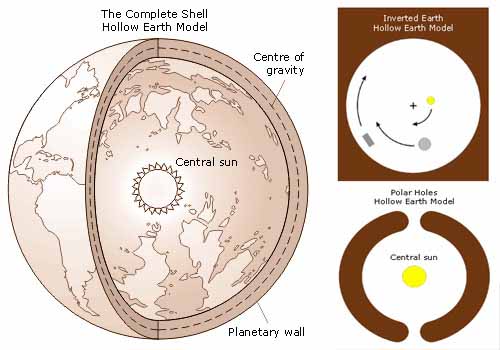
According to the Hollow Earth Hypothesis, planet Earth is either wholly hollow or otherwise contains a substantial interior space. The hypothesis has long been contradicted by overwhelming observational evidence, as well as by the modern understanding of planet formation; the scientific community has dismissed the notion since at least the late 18th century.
The concept of a hollow Earth still recurs in folklore and as the premise for a sub-genre of adventure fiction. It also features in some present-day pseudoscientific and conspiracy theories.
Underground civilizations link with the 'Hollow Earth Theory'. There are supposedly races that exist in subterranean cities beneath planet Earth. Very often, these dwellers of the world beneath are more technologically advanced than we on the surface. Some believe that UFOs are not from other planets, but are manufactured by strange beings in the interior of the Earth.
Conventional Hollow Earth Theories
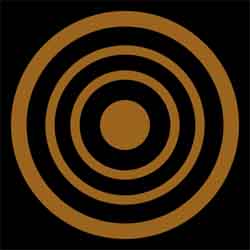
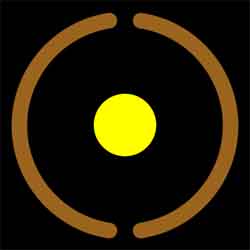
De Camp and Ley also claim that Sir John Leslie expanded on Euler's idea, suggesting two central suns named Pluto and Proserpine (this was unrelated to the dwarf planet Pluto, which was discovered and named some time later). Leslie did propose a hollow Earth in his 1829 Elements of Natural Philosophy (pp. 449Ð453), but does not mention interior suns.
Jeremiah Reynolds also delivered lectures on the "Hollow Earth" and argued for an expedition. Reynolds went on an expedition to Antarctica himself but missed joining the Great U.S. Exploring Expedition of 1838-1842, even though that venture was a result of his agitation.
Though Symmes himself never wrote a book about his ideas, several authors published works discussing his ideas. McBride wrote Symmes' Theory of Concentric Spheres in 1826. It appears that Reynolds has an article that appeared as a separate booklet in 1827: Remarks of Symmes' Theory Which Appeared in the American Quarterly Review.
In 1868, a professor W.F. Lyons published The Hollow Globe which put forth a Symmes-like Hollow Earth hypothesis, but didn't mention Symmes. Symmes's son Americus then published The Symmes' Theory of Concentric Spheres to set the record straight.
- As the story goes ... Hitler and his followers wanted to create a race of super soldiers an Ayran race (like the Atlanteans) to rule the world. They came to this conclusion through the acceptance of many occult beliefs and practices, including the Hollow Earth Theory. There is a legend which says that Hitler and his chief advisers escaped the last days of the Third Reich by going through the opening at the South Pole (Antarctica) where they discovered an entrance to the Earth's interior.According to the Hollow Earth Research Society in Ontario, Canada, they are still there. After the war, the organization claims, the Allies discovered that more than 2,000 scientists from Germany and Italy had vanished, along with almost a million people, to the land beyond the South Pole. This story gets more complicated with Nazi-designed UFOs, Nazi collaboration with the people who live in the center of the Earth, and the possible explanation for "Aryan-looking" UFO pilots.
An early twentieth-century proponent of hollow Earth, William Reed, wrote Phantom of the Poles in 1906. He supported the idea of a hollow Earth, but without interior shells or inner sun.
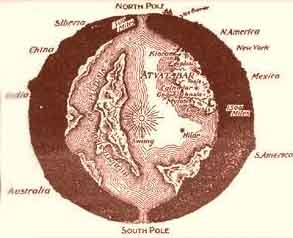
Other writers have proposed that ascended masters of esoteric wisdom inhabit subterranean caverns or a hollow Earth. Antarctica, the North Pole, Tibet, Peru, and Mount Shasta in California, USA, have all had their advocates as the locations of entrances to a subterranean realm referred to as Agartha, with some even advancing the hypothesis that UFOs have their homeland in these places.
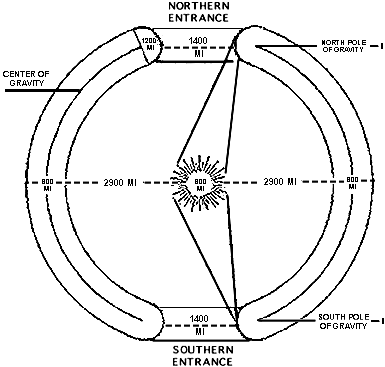
In 1964, Raymond W. Bernard, an esotericist and leader of the Rosicrucians published The Hollow Earth - The Greatest Geographical Discovery in History Made by Admiral Richard E. Byrd in the Mysterious Land Beyond the Poles - The True Origin of the Flying Saucers. Bernard tells stories about people who have entered the inner earth and what has happened to them. It mentions a photograph published in 1960 in the Globe and Mail in Toronto, Canada which shows a beautiful valley with lush hills. An aviator claimed that he had taken the picture while flying into the North Pole.
In his Letters from Nowhere, Bernard claims to have been in contact with great mystics in secret ashrams and with Grand Lamas in Tibet. He was, in short, another Gurdjieff. Dr. Bernard "died of pneumonia on September 10, 1965, while searching the tunnel openings to the interior of the Earth, in South America."
Bernard seems to have accepted every legend ever associated with the hollow Earth idea, including the notions that the Eskimos originated within the Earth and an advanced civilization dwells within even now, revving up their UFOs for occasional forays into thin air. Bernard even accepts without question Shaver's claim that he learned the secret of relativity before Einstein from the Hollow Earth people.
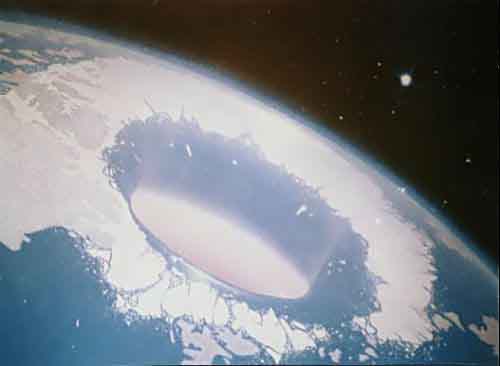
Admiral Richard E. Byrd of the United States Navy flew to the North Pole in 1926 and over the South Pole in 1929. he referred to Antarctica as "The Land of Everlasting Mystery". In reference to the North Pole he wrote: "I'd like to see that land beyond the North Pole, it is the Center of the Great Unknown."
- In his diary, Byrd allegedly tells of entering the hollow interior of the earth, along with others and traveling 17 miles over mountains, lakes, rivers, green vegetation, and animal life. He tells of seeing tremendous animals resembling the mammoths of antiquity moving through the brush. He eventually found cities and a thriving civilization. The external temperature was 74 degrees F.His airplane was greeted by flying machines of a type he had never seen before. They escorted him to a safe landing area where he was graciously greeted by emissaries from Agartha. After resting, he and his crew, were taken to meet the king and queen of Agartha. They told him that he had been allowed to enter Agartha because of his high moral and ethical character. They went on to say that they worried about the safety of planet due to he bombs and other testing done above the surface by governments. After the visit Byrd and his crew were guided back to the surface of the planet.
Byrd stated that the North and South Poles are only two of many openings into the center of the Earth. He also wrote about seeing a sun below the Earth.
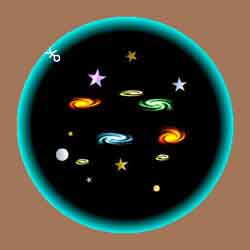
Humans live on the interior; with the universe in the center.
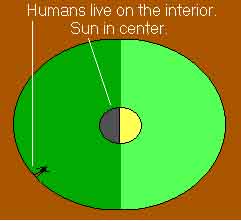
Cyrus Teed, an eccentric doctor from upstate New York, proposed such a concave hollow Earth in 1869, calling his scheme "Cellular Cosmogony". Teed founded a cult called the Koreshan Unity based on this notion, which he called Koreshanity. The main colony survives as a preserved Florida state historic site, at Estero, but all of Teed's followers have now died. Teed's followers claimed to have experimentally verified the concavity of the Earth's curvature, through surveys of the Florida coastline making use of "rectilineator" equipment.
Several twentieth-century German writers, including Peter Bender, Johannes Lang, Karl Neupert, and Fritz Braun, published works advocating the hollow Earth hypothesis, or Hohlweltlehre. It has even been reported, although apparently without historical documentation, that Adolf Hitler was influenced by concave hollow-Earth ideas and sent an expedition in an unsuccessful attempt to spy on the British fleet by aiming infrared cameras up into the sky (Wagner, 1999).
The Egyptian mathematician Mostafa Abdelkader authored several scholarly papers working out a detailed mapping of the concave Earth model. See M. Abdelkader, "A Geocosmos: Mapping Outer Space Into a Hollow Earth," 6 Speculations in Science & Technology 81-89 (1983). Abstracts of two of Abdelkader's papers also appeared in Notices of the American Mathematical Society, (Oct. 1981 and Feb. 1982).
In one chapter of his book On the Wild Side (1992), Martin Gardner discusses the hollow Earth model articulated by Abdelkader. According to Gardner, this hypothesis posits that light rays travel in circular paths, and slow as they approach the center of the spherical star-filled cavern. No energy can reach the center of the cavern, which corresponds to no point a finite distance away from Earth in the widely accepted scientific cosmology.
A drill, Gardner says, would lengthen as it traveled away from the cavern and eventually pass through the " "point at infinity" corresponding to the center of the Earth in the widely accepted scientific cosmology. Supposedly no experiment can distinguish between the two cosmologies. Martin Gardner notes that "most mathematicians believe that an inside-out universe, with properly adjusted physical laws, is empirically irrefutable". Gardner rejects the concave hollow Earth hypothesis on the basis of Occam's Razor.
In a trivial sense, one can always define a coordinate transformation such that the interior of the Earth becomes "exterior" and the exterior becomes "interior". Such transformations would require corresponding changes to the forms of physical laws; the consensus suggests that such theories tend towards sophism.
Contrary Evidence
Someone on the inside of a hollow Earth would not experience an outward pull and could not stand on the inner surface; rather, the theory of gravity implies that a person on the inside would be nearly weightless. This was first shown by Newton, whose shell theorem mathematically predicts a gravitational force (from the shell) of zero everywhere inside a spherically symmetric hollow shell of matter, regardless of the shell's thickness.
A tiny gravitational force would arise from the fact that the Earth does not have a perfectly symmetrical spherical shape, as well as forces from other bodies such as the Moon. The centrifugal force from the Earth's rotation would pull a person (on the inner surface) outwards if the person was traveling at the same velocity as the Earth's interior and was in contact with the ground on the interior, but even at the equator this is only 1/300 of ordinary Earth gravity.
The mass of the planet also indicates that the hollow Earth hypothesis is unfeasible. Should the Earth be largely hollow, its mass would be much lower and thus its gravity on the outer surface would be much lower than it currently is.
Hollow Earths in Fiction
The idea of a hollow Earth is a very common element of fiction, appearing as early as Ludvig Holberg's 1741 novel Nicolai Klimii iter subterraneum (Niels Klim's Underground Travels), in which Nicolai Klim falls through a cave while spelunking and spends several years living on both a smaller globe within and the inside of the outer shell.
Other pre-20th century examples include Giacomo Casanova's 1788 Icosameron, a 5-volume, 1,800-page story of a brother and sister who fall into the Earth and discover the subterranean utopia of the Megamicres, a race of multicolored, hermaphroditic dwarfs; Symzonia: A Voyage of Discovery by a "Captain Adam Seaborn" (1820) which reflected the ideas of John Cleves Symmes, Jr. and some have claimed Symmes as the real author; Edgar Allan Poe's 1838 novel The Narrative of Arthur Gordon Pym of Nantucket; and George Sand's 1884 novel Laura, Voyage dans le Cristal where unseen and giantcrystals could be found in the interior of the Earth.
More recently, the idea has become a staple of science fiction, appearing in print, in film, on television, in comics, role-playing games, and in many animated works.
The idea as also used by Edgar Rice Burroughs, the creator of Tarzan, in a series of novels beginning with "At the Earth's Core" (1914). Using a mechanical drill, his heroes discover a prehistoric world 500 miles below the surface. Lit by an inner sun, this inner earth is called "Pellucidar" due to the constant light of the unsetting inner sun. There is also an inner moon which creates a "Land of the Dreadful Shadow" by blocking the light of the inner sun for a portion of Pellucidar. Burroughs also makes use of the idea of openings at the poles, and has zeppelins travel to the interior of the earth via these openings. There are seven novels in the "Pellucidar"series.
Shaver contended that the Elder Superior Pre-historic Race came to this planet from another solar system in our prehistoric past. After a time of living on the surface, they realized our sun was causing them to age prematurely, so they escaped underground, building huge subterranean complexes in which to live. Eventually, they decided to seek a new home on a new planet, evacuating the Earth and leaving behind their underground cities - a honeycomb of caves in the Earth - populated by artificial beings: the evil Dero, detrimental robots and the good Tero, integrated robots. Shaver claimed to have met the Tero.
According to Shaver, the Dero, live there still, using the fantastic machines abandoned by the ancient races to torment those of us living on the surface. As one characteristic of this torment, Shaver described "voices" that purportedly came from no explainable source. Thousands of readers wrote to affirm that they, too, had heard the fiendish voices from inside the Earth.
Despite the enormous popularity of the "Shaver Mystery in Amazing Stories", Palmer milked it for all it was worth, and more. The location of the entrance to this underground world was never divulged. Although few really believed the story, and many suspect that Shaver may actually have been psychotic, Shaver always averred that his story was true.
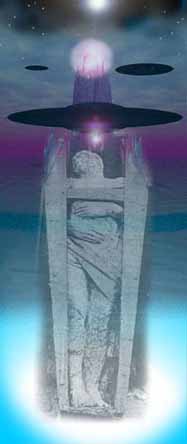 Agartha
Agartha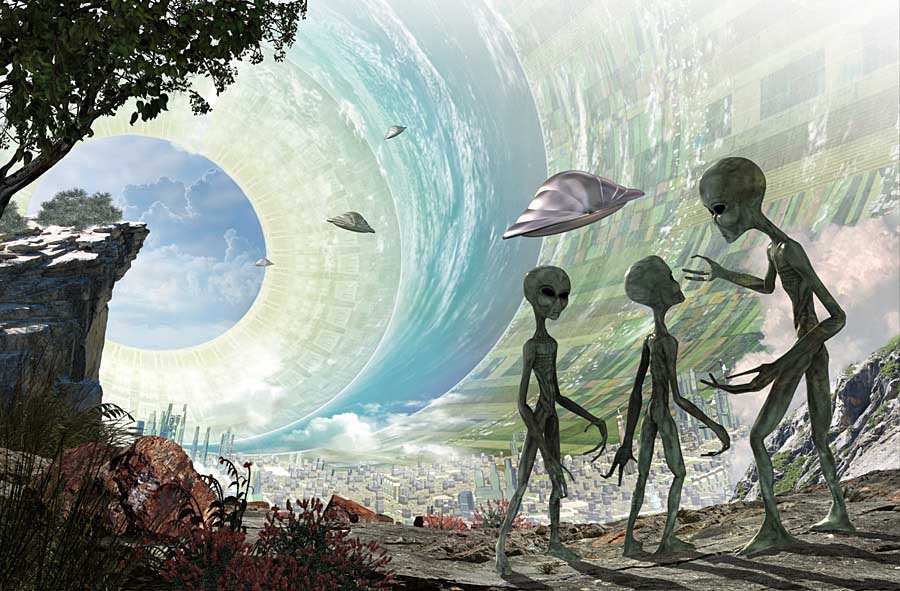
No comments:
Post a Comment